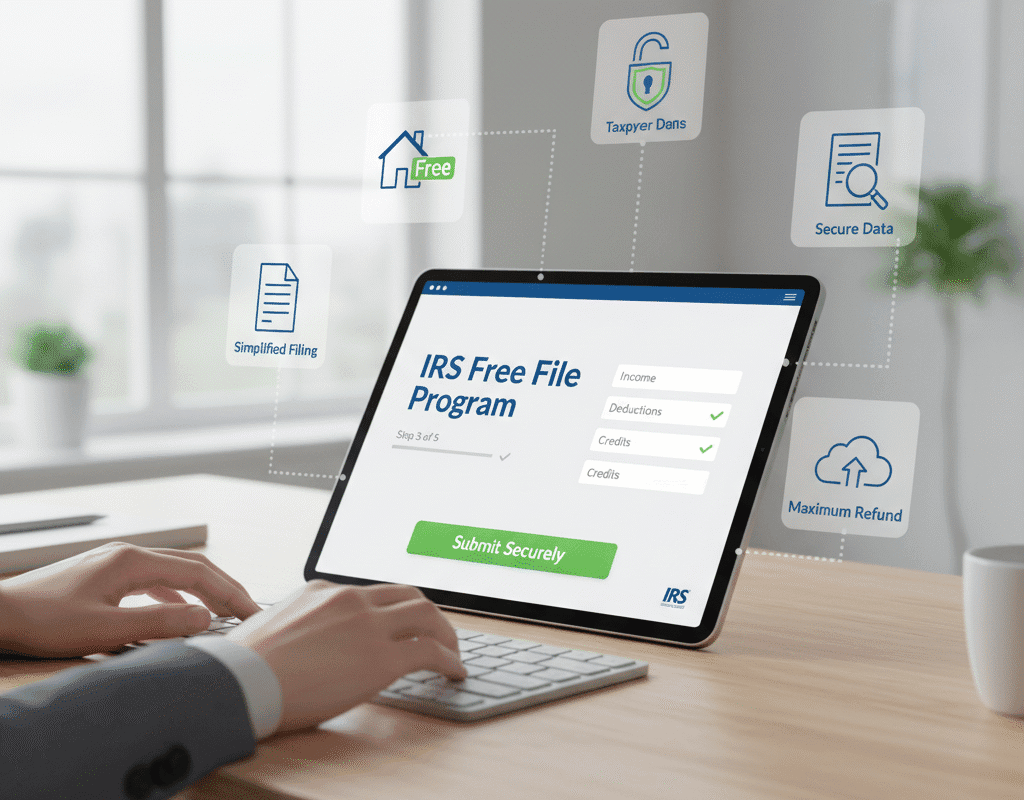The Role of the IRS Free File Program:
The Role of the IRS Free File Program:
Millions of Americans start the yearly process of filing their federal income tax returns as tax season draws near. Many people find this process intimidating since it frequently involves complicated forms, unclear regulations, and the possibility of mistakes. Recognizing the need for accessible and affordable tax filing, the Internal Revenue Service (IRS) has been offering the IRS Free File Program—a valuable initiative aimed at simplifying tax filing for eligible taxpayers.
HSBC Cashback Credit Card 2025 – Benefits, Rewards & How to Apply?

Understanding the IRS Free File Program
The IRS Free File Program is a partnership between the IRS and private tax software companies that allows eligible taxpayers to file their federal tax returns online at no cost. The program was launched to provide a reliable, user-friendly, and cost-free alternative to traditional tax preparation methods.
Under this program, taxpayers can access commercial tax preparation software without paying for federal filing fees. Participants can enjoy guided support, step-by-step instructions, and error-checking tools, making tax filing more manageable even for first-time filers.
Eligibility for IRS Free File
Eligibility for the IRS Free File Program is primarily income-based. For the 2025 tax season, the program typically targets taxpayers with an adjusted gross income (AGI) below a specified threshold, often around $73,000. However, the exact limit may vary slightly each year, so it is essential for taxpayers to check the latest guidelines on IRS updates.
Eligible taxpayers may also qualify for additional features, such as:
- Free state tax filing for some states
- Free technical support from participating software providers
- Guided filing tools for complex tax situations, including credits and deductions
How the IRS Free File Program Operates
The IRS and commercial tax preparation firms work together to run the IRS Free File Program. The program can be used by taxpayers in the following ways:
- Visit the IRS Free File Portal: Taxpayers can view participating software vendors by visiting the official IRS Free File page.
- Choose a Provider: A number of companies that provide free filing services are listed by the IRS. Depending on their preferences, the complexity of their tax situation, or other services, users can select a provider.
- Verify Eligibility: Providers will check income eligibility to ensure the taxpayer qualifies for the free program.
- Prepare and File: Using the software, taxpayers enter income, deductions, and credits. The software helps maximize refunds and minimize errors.
The IRS Free File Program’s Advantages
For millions of Americans, the IRS Free File Program is a vital resource due to its many advantages:
- Cost Savings: Taxpayers can avoid paying hundreds of dollars for professional tax services by doing away with filing fees.
- User-Friendly Interface: Even novices can file because the program walks them through each step.
- Error Reduction: Integrated error checks assist in minimizing errors and preventing IRS fines.
- Faster Refunds: Direct deposit choices and electronic filing speed up the refund procedure.
- Secure Filing: Sensitive taxpayer information is protected by partner software vendors who follow IRS security guidelines.
- Support for Credits and Deductions: Free File software ensures that taxpayers receive the largest possible refund by assisting in the identification of appropriate tax credits and deductions.
The IRS Free File Program and Digital Transformation
In recent years, the IRS has emphasized digital transformation, aiming to make tax administration more accessible and convenient. The Free File Program is central to this effort. By encouraging online filing, the IRS reduces paper processing, improves accuracy, and accelerates refunds.
Moreover, the program plays a role in financial literacy and digital inclusion, helping Americans navigate tax laws and adopt digital tools confidently. For many, Free File serves as an introduction to e-filing, which they may continue using in future years..
Obstacles and Reactions
While the IRS Free File Program is widely praised, it has faced criticism in the past. Among the difficulties are:
- Limited awareness: Many eligible taxpayers are unaware of the program and miss out on free filing opportunities.
- Complex eligibility rules: Understanding income thresholds and provider-specific requirements can be confusing.
- State filing fees: While federal filing is free, some providers charge for state returns.
The IRS continues to address these challenges through public awareness campaigns, simplifying eligibility criteria, and expanding partnerships with software providers.
Impact on Taxpayers
Since its inception, the IRS Free File Program has made a significant impact on American taxpayers:
- Millions of users: Millions of Americans utilize the program each year, reducing the burden of professional tax services.
- Increased e-filing rates: The program has contributed to a rise in electronic filing, streamlining IRS processing.
- Financial relief: Free filing has saved taxpayers substantial amounts in fees, particularly benefiting low-to-moderate-income households.
In the broader context, the Free File Program enhances trust in the IRS by providing transparent, efficient, and accessible services to the public.
In conclusion: The Role of the IRS Free File Program
The IRS Free File Program is a cornerstone of the IRS’s mission to provide accessible, accurate, and efficient tax services to American taxpayers. By offering free online filing options, the program helps millions navigate the complexities of federal tax filing without financial burden.
As tax season 2025 approaches, eligible taxpayers are encouraged to explore the Free File Program and take full advantage of its benefits. Beyond cost savings, the program fosters digital literacy, ensures accuracy, and contributes to a more modern and efficient tax administration system.
For Americans seeking a reliable, cost-free, and user-friendly way to file taxes, the IRS Free File Program remains an essential resource—demonstrating that navigating taxes doesn’t have to be overwhelming or expensive.
The Impact of Basel III Regulations on U.S. Banks: What You Need to Know
The Impact of Basel III Regulations on U.S. Banks: What You Need to Know
